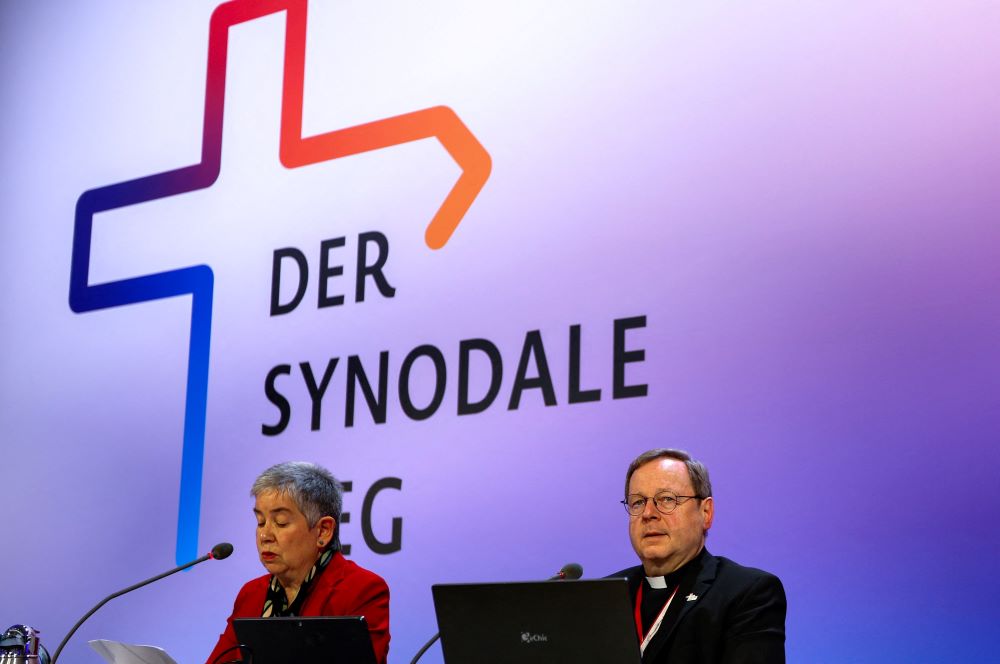
Irme Stetter-Karp, president of the Central Committee of German Catholics and co-chair of the Synodal Path, and Bishop Georg Bätzing, president of the German bishops' conference, attend the fifth synodal assembly in Frankfurt March 9, 2023. (OSV News/Reuters/Heiko Becker)
March 22 was a significant day for Catholics in Germany. The heads of the German bishops' conference traveled to Rome to speak to Vatican leaders and look for a way out of the impasse they have found themselves in.
Limburg Bishop Georg Bätzing, the leader of the German bishops, and others sat down for an entire day with Cardinals Pietro Parolin, Victor Fernandez, Robert Prevost, Arthur Roche and Kurt Koch. Nobody was even supposed to know about the meeting until one Vatican official told the press. That night, at 8 p.m., the two sides published a joint statement to tell the world about their compromise. A very unusual step.
What was the compromise about? To explain you have to understand a bit of the German mindset here. It's all about councils, committees, statutes and assemblies.
Although the "synodal path" assemblies concluded last year with calls for major reforms in the church, these reforms for the most part are not to be implemented before 2026, when the successor synodal council takes up work. This council is supposed to consist of the same number of bishops and laypeople to vote on any further reforms in Germany together. Before that, though, there is yet another group coming together, the synodal committee — its only purpose being to establish the statutes and regulations for the coming synodal council.
All a bit confusing, and all a bit German.
It is a step forward from the icy silence of the past few months, but in no way a compromise on actual reform issues.
This synodal committee was the main reason for the most recent tensions between the Vatican and German bishops. According to Vatican officials, such a committee — where bishops and laypeople have shared power to vote and decide as equals — goes against the norms of the Code of Canon Law, as the bishop as head of his diocese could theoretically be outvoted. The German church has a different interpretation, as Essen Bishop Franz-Josef Overbeck has put it many times: Episcopal authority is not hindered by involving lay people in decision making, it is strengthened by it.
Two sides, two viewpoints and not really any willingness to compromise. Until this fateful March 22 and the joint statement of the Holy See and the German bishops.
Their compromise: The German synodal committee can keep working, but the Holy See has to approve every step. Is this a win for either side? The German bishops seem to think so, as on March 25 they published a letter in tandem with the leading German lay group ZdK (Central Committee of German Catholics), announcing their plans to vote on the synodal committee's statutes at the end of April and assemble the committee in June. According to their statement, they see the compromise with Rome as an encouragement to keep going down the road of reform.
More conservative outlets and commentators disagree. They see the reform-happy Germans being reined in, as they point to the now-explicitly required Roman approval for their next reform steps. This could be the biggest hurdle on the German synodal reform path. As we know, Rome is quite critical of German ideas.
Advertisement
Even though the German bishops accepted this latest compromise, the next conflict is already scheduled: When the synodal committee meets June 14-15, Rome will have to approve its decisions. The reform ideas are already in the books, as the final assembly of the "synodal path" decided on them in March 2023. What will happen when the synodal committee tries to implement them? When they take the step to officially establish their new council, and ask Rome for approval? It's hard to believe that Vatican officials will just wave them through.
The Germans need some leeway and good will from Rome for their ideas. Until now, this seemed impossible. After the latest meeting the door seems to have opened a tiny bit. At least for now tensions seem to have relaxed a bit, and both sides seem to be willing to work together.
It is a step forward from the icy silence of the past few months, but in no way a compromise on actual reform issues. Yet, there are still two positives to take from this: Both sides are talking to each other again, and they were willing to look for a compromise that allowed both sides to save face. How this will work out in the long run, we shall have to see.








